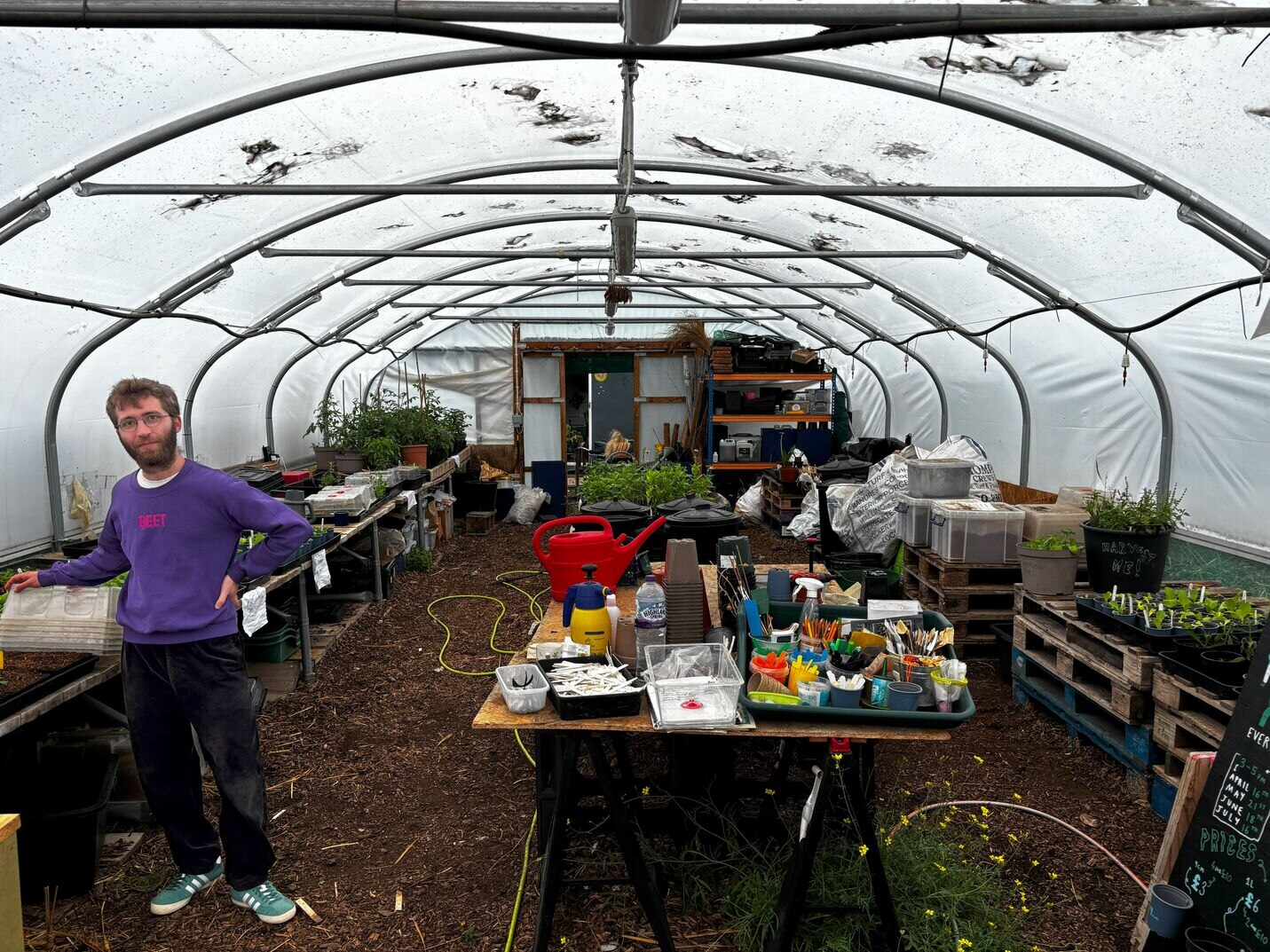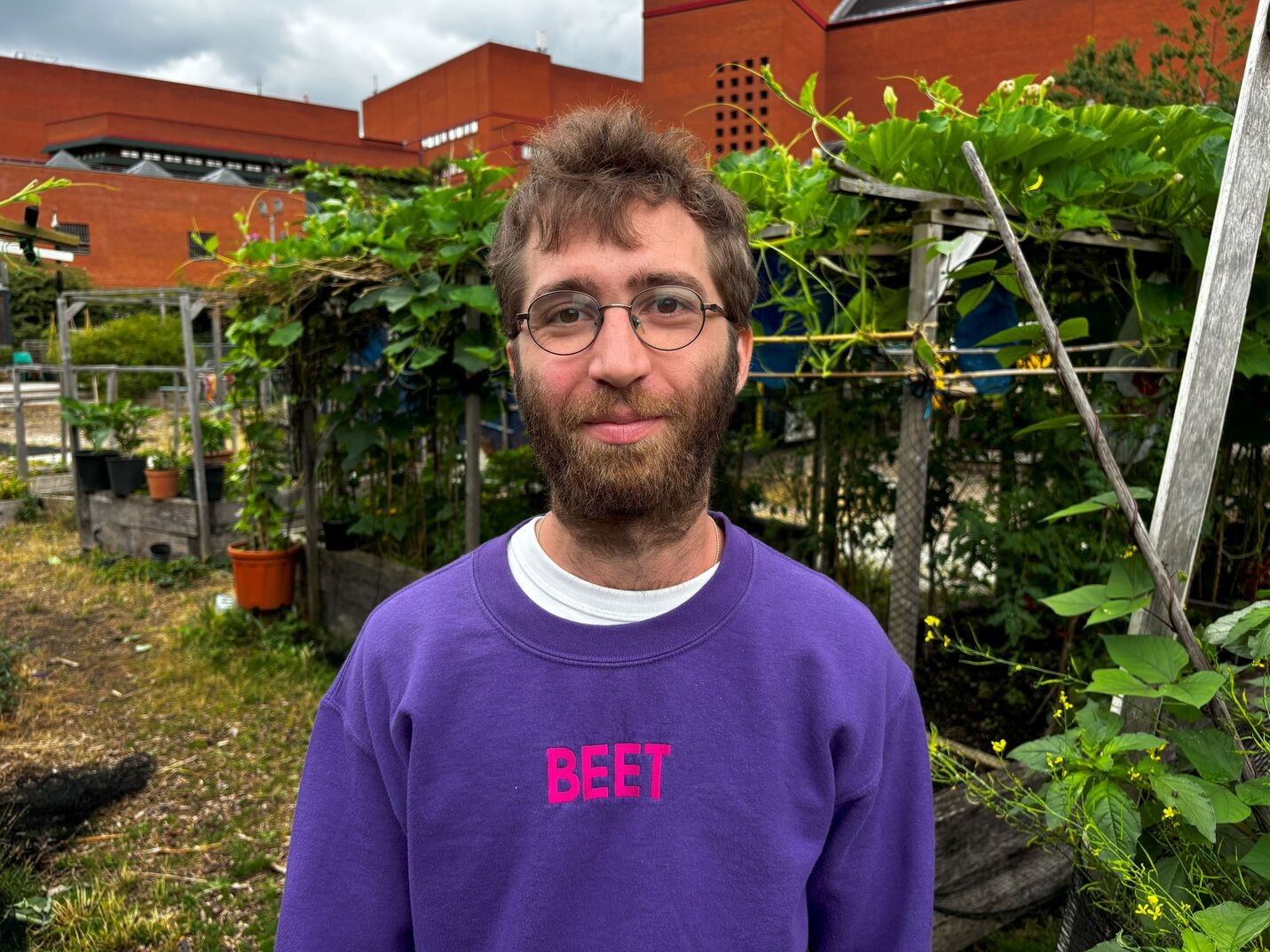LADIES IN BLOOMERS
LADIES IN BLOOMERS
A 'horti-musical' celebration of forgotten female gardeners
Regent Theatre, Regent High School
To mark the 6th birthday of the Story Garden at the British Library, we paid a visit to catch up with composer Omri Kochavi ahead of the world premiere of his new piece Ladies in Bloomers.
Commissioned by the London Sinfonietta and developed in collaboration with local gardeners and vocalists, Ladies in Bloomers is inspired by the stories of women gardeners during the First World War - exploring themes of resilience, care, and community through music, movement, and the act of gardening itself.
In this interview, Omri shares his reflections on composing for outdoor spaces, working with community participants, and why gardens and music have more in common than you may think.

1. What makes the Story Garden a powerful setting for music and community gathering?
So I think Story Garden is, for me, a prime example of what urban gardening looks like in today's age. We're in the middle of the city - and it's not a small city - we have the British Library over here, lots of social housing over there, the Google office over there. And they're all involved in the Story Garden in some way, and the Story Garden is involved with them in some way. I think it truly emphasises the diverse and central place that community gardening and urban nature can have in our cities - and I think it just does it in such a great and beautiful way. So I really feel like it’s a perfect venue for my piece.
2. How did the environment of your garden / the Story Garden influence your piece?
Good question. I have a garden - I'm lucky to have my own little allotment behind my ex-council flat - and I do gardening there. I came to do gardening here [at the Story Garden], as well, and I think more than anything it helped me feel [connected] to the women that the book and the piece is about. It was 100 years ago… obviously the climate is changing all around us, but reading the book and seeing that they also had to figure out what to do with snails eating the little cucumber plants, and that they also had to carry heavy watering cans down the stairs to their garden - it really helped me relate across time to these stories. I could position myself in the stories and, in the same way, picture those women here in this garden doing similar work.
So, I think the kind of timelessness of gardening really influenced how I thought about the piece and how I identify with its subject. Also, as you’ll hear, it makes [the piece] slightly more playful. When you think about snails and slugs, it kind of puts you in a state of mind that’s just a little more down to earth.
3. How do you hope your music speaks to people who might not usually attend a classical contemporary concert?
I've done things recently in these more nature settings - a piece of mine was played at the Barbican Conservatory a month ago - and it was really interesting to see. It was a sold out concert, around 100-150 people, and for a lot of them, it was probably the first contemporary music concert they’ve seen - or definitely not something they [attend] regularly.
I think we have a lot of preconceptions about how people conceive contemporary music - and I think a lot of [those preconceptions] come from inside the music industry. But when you manage to reach people outside of it, it just becomes much more of a non-issue. People come to a space that they enjoy, and they hear a performance – and I think that really helps to take you, as a composer, out of the usual perceptions of what a contemporary music concert [is “supposed” to] look like. You start thinking of the event simply as an event, and how it can speak to the communities that come to see it - whether they're from a music background or not, whether they usually go to concerts or not at all.

4. Did any aspect of this collaboration challenge or expand your usual way of thinking about music?
Yes. I think yes and yes and yes! There were a lot of things about this piece that were new to me - which is always exciting for a composer, I think.
We’re just in the garden – I don’t know if you can see, but it's on-and-off rain - so trying to do a piece outdoors in the UK definitely has its challenges. We all hope it’ll be a nice sunny day, but we also know it might not be. I think that affects how you think about the piece.
Also, on a musical level, there are things you can do indoors in a very silent, perfect concert space that just won't be as effective in an outdoor space. So that also made the music different.
But most importantly, working with the gardeners – it’s been challenging, but in the best way possible. Since we've made contact with the Story Garden, I came here several times by myself. We also came here with the team from the Sinfonietta - we did the workshop, we did some singing, and gardening (obviously). Just getting to know the people, and visualising them in the piece was again a new and great experience for me because it’s the first time I'm doing something with such direct community participation.
And there's fun challenges about it, like “okay what exactly are they doing?” I knew I wanted to have the gardeners in the piece, but what exactly they would be doing went through several twists and turns. And then whatever they do needs to be practical - it needs to work within the time that we have to rehearse the piece and bring together musicians, singers, and gardeners. So it really made it different composing experience for me – and I think that resulted in a different kind of piece.
5. What role should music play in addressing issues like urban isolation or community well-being?
Tough question.
Music and gardening actually have quite a lot in common. They both bring us together - to make things, to nurture things. And [they] take us out of our screens and into the real world - whether we're making sounds or we're making plants and growth. It's all tactile, physical work. And I think that’s so important - I know that for me, as someone who does still need to spend a lot of time in front of the computer, also a lot of it by myself as a composer - the strength of both music and gardening is in meeting people in a tactile, real environment and making things together.
So in that way, I think bringing the two together is always something I really enjoy doing - as someone who enjoys both things. And I think, and hope, that it will always bring more people from both sides - both fields – to benefit from each other's craft.
6. How do you think music can enhance the experience of being in a garden?
It's hard to enhance the experience of being in a garden, because it's a great experience anyway -especially in this garden. But I think an interesting way to think about it is what happened in the workshop when we were here.
Part of the workshop - apart from the wonderful singing of all the gardeners - was also capturing the sounds of gardening, which will be used in the piece through processed electronic sounds. And what was really interesting to see is that a lot of [the gardeners], - whether volunteers or staff gardeners who’ve been gardening for many years - suddenly went “Oh, watering this specific skip makes such a good sound,” or “The way these apple leaves kind of rattle against each other - I never really thought about it as sound.”
But once given the prompt - to find the sounds in the garden that interested them - they started to look at the garden in a musical way. So I think that having performance in a garden can do that but it can also make even more use of these spaces that are really such great spaces and spaces that add so much meaning to living in a city.
Also that's what gardens used to be - in this country and other places as well. Gardens- whether private or public - used to be not only a place of work and nutrition, they were also places of meeting, a space of social gathering and a space of performances. So I think for me, it's really nice to go back to those roots - of what gardens are, and what they used to be – and to really make use of these kinds of spaces that are so needed in our urban jungle.
Ladies in Bloomers premieres on Sunday 14 September at the Story Garden, with an introduction by An Almost Impossible Thing author Fiona Davison, whose work inspired Omri's piece.
Published: 23 Jul 2025